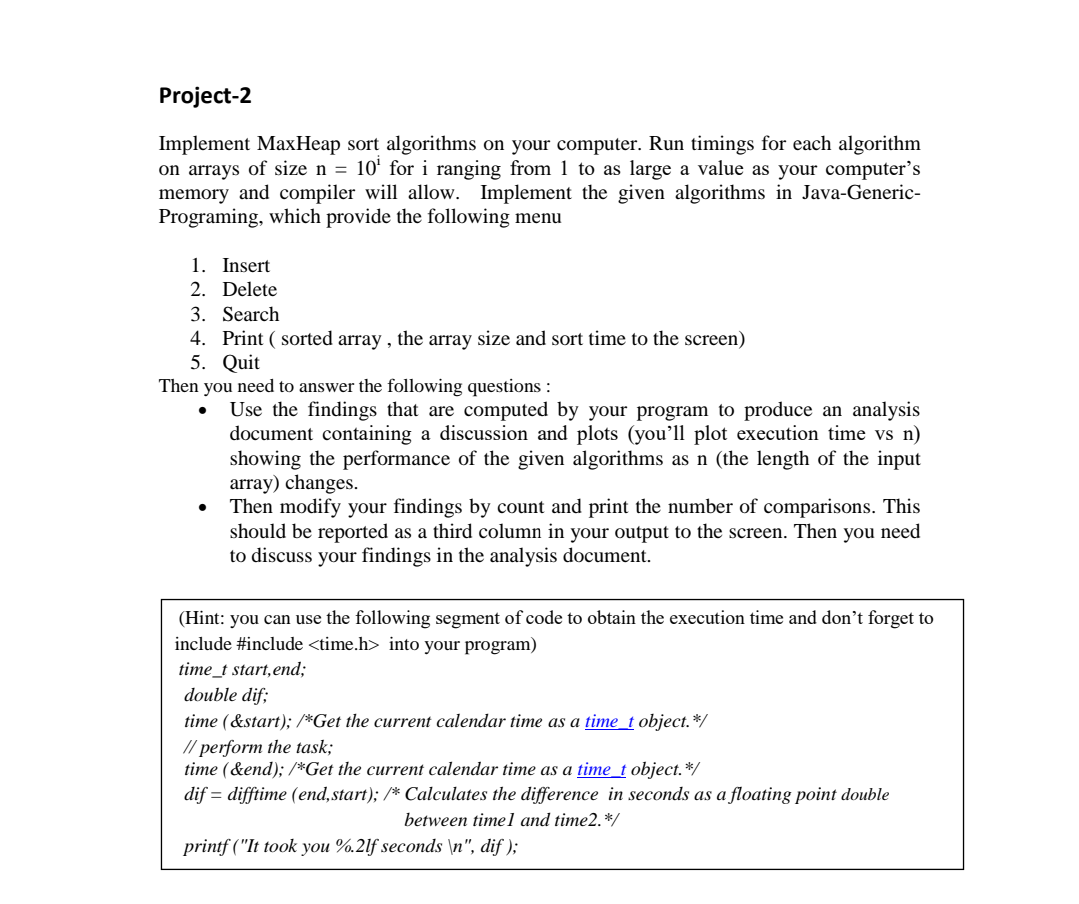Implement MaxHeap sort algorithms on your computer. Run timings for each algorithm on arrays of size n = 10' for i ranging from 1 to as large a value as your computer's memory and compiler will allow. Implement the given algorithms in Java-Generic- Programing, which provide the following menu 1. Insert 2. Delete 3. Search 4. Print ( sorted array , the array size and sort time to the screen) 5. Quit Then you need to answer the following questions : • Use the findings that are computed by your program to produce an analysis
Implement MaxHeap sort algorithms on your computer. Run timings for each algorithm on arrays of size n = 10' for i ranging from 1 to as large a value as your computer's memory and compiler will allow. Implement the given algorithms in Java-Generic- Programing, which provide the following menu 1. Insert 2. Delete 3. Search 4. Print ( sorted array , the array size and sort time to the screen) 5. Quit Then you need to answer the following questions : • Use the findings that are computed by your program to produce an analysis
Computer Networking: A Top-Down Approach (7th Edition)
7th Edition
ISBN:9780133594140
Author:James Kurose, Keith Ross
Publisher:James Kurose, Keith Ross
Chapter1: Computer Networks And The Internet
Section: Chapter Questions
Problem R1RQ: What is the difference between a host and an end system? List several different types of end...
Related questions
Question
100%
NetBeans

Transcribed Image Text:Project-2
Implement MaxHeap sort algorithms on your computer. Run timings for each algorithm
on arrays of size n = 10' for i ranging from 1 to as large a value as your computer's
memory and compiler will allow. Implement the given algorithms in Java-Generic-
Programing, which provide the following menu
1. Insert
2. Delete
3. Search
4. Print ( sorted array , the array size and sort time to the screen)
5. Quit
Then you need to answer the following questions :
Use the findings that are computed by your program to produce an analysis
document containing a discussion and plots (you’ll plot execution time vs n)
showing the performance of the given algorithms as n (the length of the input
array) changes.
Then modify your findings by count and print the number of comparisons. This
should be reported as a third column in your output to the screen. Then you need
to discuss your findings in the analysis document.
(Hint: you can use the following segment of code to obtain the execution time and don't forget to
include #include <time.h> into your program)
time_t start,end;
double dif;
time (&start); /*Get the current calendar time as a time_t object.*/
// perform the task;
time (&end); /*Get the current calendar time as a time_t object.*/
dif = difftime (end,start); /* Calculates the difference in seconds as a floating point double
between time l and time2.*/
printf ("It took you %.2lf seconds \n", dif );
Expert Solution
This question has been solved!
Explore an expertly crafted, step-by-step solution for a thorough understanding of key concepts.
Step by step
Solved in 2 steps

Recommended textbooks for you

Computer Networking: A Top-Down Approach (7th Edi…
Computer Engineering
ISBN:
9780133594140
Author:
James Kurose, Keith Ross
Publisher:
PEARSON

Computer Organization and Design MIPS Edition, Fi…
Computer Engineering
ISBN:
9780124077263
Author:
David A. Patterson, John L. Hennessy
Publisher:
Elsevier Science

Network+ Guide to Networks (MindTap Course List)
Computer Engineering
ISBN:
9781337569330
Author:
Jill West, Tamara Dean, Jean Andrews
Publisher:
Cengage Learning

Computer Networking: A Top-Down Approach (7th Edi…
Computer Engineering
ISBN:
9780133594140
Author:
James Kurose, Keith Ross
Publisher:
PEARSON

Computer Organization and Design MIPS Edition, Fi…
Computer Engineering
ISBN:
9780124077263
Author:
David A. Patterson, John L. Hennessy
Publisher:
Elsevier Science

Network+ Guide to Networks (MindTap Course List)
Computer Engineering
ISBN:
9781337569330
Author:
Jill West, Tamara Dean, Jean Andrews
Publisher:
Cengage Learning

Concepts of Database Management
Computer Engineering
ISBN:
9781337093422
Author:
Joy L. Starks, Philip J. Pratt, Mary Z. Last
Publisher:
Cengage Learning

Prelude to Programming
Computer Engineering
ISBN:
9780133750423
Author:
VENIT, Stewart
Publisher:
Pearson Education

Sc Business Data Communications and Networking, T…
Computer Engineering
ISBN:
9781119368830
Author:
FITZGERALD
Publisher:
WILEY